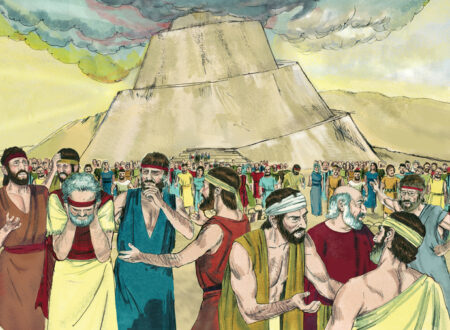Passover Message to the Noahide Convention in Kenya
On the occasion of their
Third Annual Noahide Convention
Nakuru, Kenya, 13th of April, 20’19 (8th of Nissan, 5779).
From Dr. Michael Schulman, Director of Ask Noah, and Rabbi Moshe Weiner, Overseeing Rabbinical Authority
It is with great pleasure that we extend our blessings for your entire community in Kenya! You are serving as a shining example for all Noahides. The current month of Nissan is the head of the months of the year in the Hebrew calendar. May you be blessed in the year ahead, and always. Our wishes for you include long life in good health, happiness, and spiritual and material success. Torah teaches that when something good occurs three times, it gains a special strength (chazakah) for the future. Therefore, we pray that your Annual Noahide Convention will be a chazakah of unity, growth and well-being for your community.

A month known for miracles
Nissan is the month in which Passover occurs, and it is known as the Month of Miracles. Many people say that they need proof of G-d’s existence before they will believe in Him. Certainly there is proof from miracles that G-d has performed in the world which openly overrode “laws of nature”. It is also a logical conclusion based on the facts: (1) the universe exists, and (2) nothing can create itself. An intellectually honest person is compelled to acknowledge that there is the One Creator, beyond any limitations. It is He Who created the universe, and He governs this world for the sake of human beings. He governs the entire universe for the sake of this world.
With modern science, it is now possible to delve into the minute details of created things. In doing so, we discover their inherent miraculous nature, which is the signature of their obviously intelligent design. Nature itself, and the existence of nature, is now revealing the immanent Divine Presence within the creation. Beyond this is the faith and apprehension that the Creator Himself is transcendent beyond time and space, and beyond anything that has limitation, which includes the Heavens and all their hosts.
How an obvious miracle should, and should not, be interpreted
There are two possible responses when one is confronted with a miracle that has no natural explanation, and it thus forces him to admit that it was brought about by G-d: (1) the person can still try to define it as much as possible in natural terms, or (2) based on his faith in G-d, he can acknowledge that it transcends nature completely, and he will look instead for the lesson that G-d is teaching through the particular way in which He chose for the miracle to take place.
These options we have in how to look at miracles are a means by which G-d can test a person’s faith in Him. On the one hand, does the person acknowledge that “nature” itself is, by its very nature, miraculous and fashioned by G-d for the sake of human beings?
This is brought out by the following teaching in the Talmud: “Rabbi Yochanan said: Even if the Torah had not been given [G-d forbid!], we would still have learned modesty from the cat, which covers its excrement, and that stealing is objectionable from the ant, which does not take grain from another ant, and forbidden relations from the dove, which is faithful to its partner, and proper relations from the rooster, which first appeases the hen and then mates with it.”
Biblical miracles that were denied in Biblical times
Opposite to this, some people will stubbornly presume that even the greatest miracle is not really a miracle. G-d fashions His miracles in ways that provide people with the opportunity to make that mistake. For example, the Midrash relates that when G-d split the sea for the Israelites on the seventh day of Passover, He also split all the other waters, and many Gentiles attributed this to some natural phenomenon.
It was not until they learned that it was done in conjunction with G-d’s splitting the sea for Jewish people that the fear of G-d fell upon them. Similarly, many of those who built the Tower of Babel maintained that the worldwide Flood which Noah and his family survived had been a natural event. They said that their tower would support the heavens and prevent the same catastrophe from happening again.

Comparing the Pharaoh to Naaman
This is also the lesson of the Torah portion of Metzorah (Lev. 14-15). A metzorah was a person whom G-d afflicted with a miraculous skin disorder called tzara’as. It was a message from G-d that the person is doing wrong in certain ways, which he needs to repent from and better himself. The sins that made one liable to receive tzara’as resulted from the person’s undo self-pride. The person could claim that his tzara’as was a natural disease and look for medical remedies, or he could admit it was brought on by his sin, and humble himself before G-d and repent, and G-d would then remove it.
Torah teaches about two Gentiles who were afflicted with tzara’as, who reacted in those two ways. One was the Pharaoh who enslaved the Israelites. The Midrash relates that he claimed it was a natural disease, and he sought a cure by slaughtering Israelite infants and bathing in their blood. In his stubbornness, he greatly magnified his sin.
The other Gentile was Naaman, the general of Aram (II Kings, chapter 5). Aram was an enemy of Israel, but Naaman accepted the advice that he should seek a cure from the Jewish prophet Elisha. After initial resistance to Elisha’s instructions, he humbled himself and followed the simple directive, and he was instantly cured. This inspired him to reject the idolatry of Aram, and to be a Righteous Gentile who worshiped only G-d, with full respect for the Holy Land of Israel. He even merited that a Torah law within the Noahide Code was taught through him: that a Noahide is permitted to feign idolatry in order to save his life.
By Dr. Michael Schulman
Based on teachings of the Lubavitcher Rebbe, in honor of his birthday (11 Nissan).









